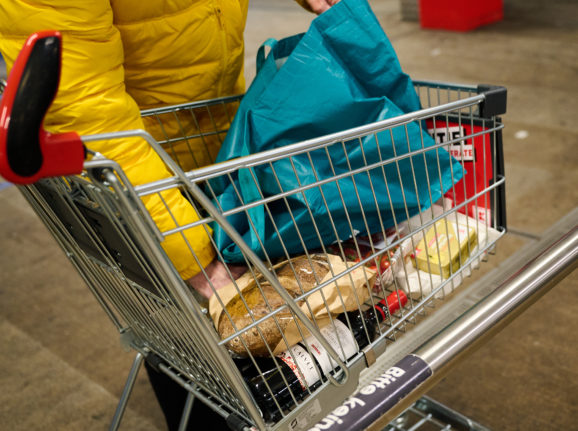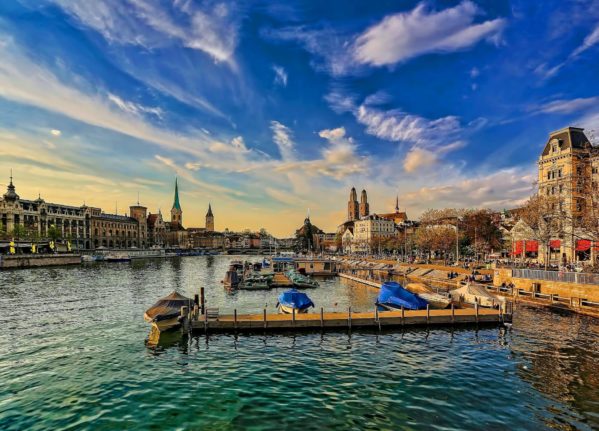What’s happening?
Since Russia invaded Ukraine in late February, experts have warned that there could be supply issues for items – such as sunflower oil and flour – and that consumer prices will rise.
Since then photos have emerged on social media of empty shelves, signalling that people are panic-buying.
Supermarkets also say they are noticing an increased demand for cooking oils, and have introduced measures such as temporarily restricting sales to one or two bottles per customer.
READ ALSO: Consumer prices in Germany expected to rise further
What’s the reaction?
The Federal Association of the German Food Trade (BVLH) has appealed to people in Germany to avoid hoarding items.
Photos of empty shelves are a reminder of the early pandemic days in 2020 when people in Germany (and across the world) cleared out supermarkets of items like toilet roll, flour, pasta and hygiene products.
As was the case at the beginning of the coronavirus crisis, customers should “show solidarity with each other and only buy products in household quantities”, said association spokesman Christian Böttcher on Tuesday.
The Twitter post reads: “The people who fought over toilet paper in the pandemic yesterday will fight over cooking oil and flour tomorrow. Welcome to Germany!”
Die Leute, die sich gestern in Pandemie um Klopapier geprügelt haben, prügeln sich morgen um Speiseöl und Mehl.
Willkommen in Deutschland! 🙄😂 pic.twitter.com/aLqP1DpUfr— Fabi Taub 🇩🇪🇺🇦🕊️ (@FabiTaub) March 12, 2022
Is there actually shortage of cooking oil and other products?
Böttcher said that the trade association did not yet have any information about a nationwide shortage of sunflower oil in the German retail sector.
However, Ukraine is an important raw material supplier of sunflower oil – and Germany is one of its largest importers.
Ukraine “accounts for 51 percent of the quantity available on the world market and is one of the most important importing countries for Germany”, said Böttcher.
Russia and Ukraine also make up about 30 percent of the world’s wheat exports. As both countries are now largely out of business as suppliers because of the war, experts are warning of price increases and shortages.
Böttcher said there would be effects on the German market if important suppliers continue to be affected.
But it remains to be seen “to what extent rising costs at the preliminary stages as a result of the Russia-Ukraine war will be passed on through the chain”, he said.
“Economists, however, assume that the general inflation in food will continue for the time being,” Böttcher said. Longer-term forecasts aren’t possible because of the turbulence on the markets, he added.
READ ALSO: How prices in Germany will rise as the war in Ukraine continues
Earlier in the day, the Association of the Oilseed Processing Industry in Germany (OVID) told DPA that sunflower oil could become scarce in Germany within a few weeks.
However, shortages and price rises are not just down to the war. Failed harvests and the pandemic have contributed to the problem in recent months.
A Twitter user posts a sign in a shop says only two bottles of oil are allowed per household.
Erst Scheißpapier und jetzt Sonnenblumenöl? Was ist hier los? pic.twitter.com/ynTFtjVgAl
— Jacek Witold 🇺🇦🇵🇱↙↙↙ (@VytautasLife) March 11, 2022
What are retailers saying?
Hanna Koll, a spokesperson for the supermarket Edeka told German media group RedaktionsNetzwerk Deutschland (RND) that, generally, “a sufficient supply of all products for daily needs” is ensured.
“In individual cases, however, there may be short-term supply bottlenecks for certain products,” she added. “This applies in particular to cooking oils, some of which also come from Ukraine.”

Contrary to some media reports, Aldi Nord has not yet began rationing oil, the company told RND.
“At ALDI Nord, there are currently no general sales restrictions on the product range, although we generally ask our customers to buy only in household-standard quantities,” a spokesperson said. The sale of some goods, including cooking oils, currently fluctuates from day to day. As a result, some items may be out of stock for a short time, the spokesperson added.
A Netto spokesperson told RND that the local supply of all products for daily needs is guaranteed.
“In the past few weeks, demand in some product ranges has basically been at a high level, but our logistics have adjusted to this,” the spokesperson said.
“Should there be short-term supply bottlenecks for certain products in individual cases – as is the case in particular with cooking oils originating from Ukraine – our customers can generally benefit from our range of around 5,000 articles and can fall back on private label and branded articles as product alternatives,” said the spokeswoman, urging that there is no need to stockpile.
READ ALSO: How the cost of living crisis is affecting everyday life in Germany
A Lidl spokeswoman also said the supply of goods in the shops was guaranteed. “Only individual products can experience delivery delays,” she said. “Since we offer our customers a diverse range at attractive prices, there are always enough alternatives available.”
Regardless of the current situation, Lidl sells goods in household quantities, the spokeswoman said.
The German Retail Association (HDE) recently stated that it did not expect supply bottlenecks in items due to the war in Ukraine.
Germany, like Ukraine, is a food exporter of meat, wheat and dairy products.
German Minister of Agriculture, Cem Özdemir, also said he considered the supply “secured”, but warned of price increases.
While the impact on Germany is likely to be limited, UN Secretary-General António Guterres recently warned of a “hurricane of hunger” worldwide. The international community must act to prevent a “meltdown of the global food system”, he said.
Did you know?
Der Hamsterkauf is a German word used to describe the panic buying or hoarding that occurs during times of widespread fear or concern.
It comes from the verb hamstern because hamsters are known for filling their cheeks with food.





 Please whitelist us to continue reading.
Please whitelist us to continue reading.
Here we go again. The self fulfilling prophecy has begun again.
I own shares of milka. So naturally if you ask me. Milka chocolate shortage. Buy buy buy people.